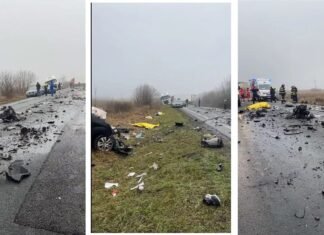Hot News
George Simion, a prominent political figure in Romania, recently opened up about his relationship with Nicușor Dan, the current Mayor of Bucharest. In a candid discussion, Simion revealed that he had supported Dan during his initial campaign for the mayoralty back in 2012. This support included hands-on efforts, such as helping to put up campaign posters, highlighting the deep-rooted connection between the two politicians.
Their relationship has evolved over the years against the backdrop of Romania’s dynamic political landscape. Simion emphasized the importance of collaboration in politics, especially when it comes to local governance. By recounting his experiences from a decade ago, he illuminated the ongoing transformations in Bucharest and the challenges that come with urban management.
Simion’s reflection on their past indicates a level of camaraderie that goes beyond mere political alliances. He recalled how their shared visions and objectives in 2012 laid the groundwork for the political movements they have championed since then. While at the time, both operated in different spheres, their collective efforts aimed at improving the city’s infrastructure and addressing social issues resonated with voters.
As the political climate shifts, Simion acknowledged that maintaining a supportive relationship can sometimes be a challenge. Differences in vision and approach can arise, especially when tackling complex issues such as economic development, public safety, and community engagement. Despite these challenges, the importance of continuing dialogue and partnership remains crucial for both leaders.
In recent years, while Nicușor Dan has focused on modernizing Bucharest and implementing various reforms, Simion has been involved in broader political movements within the country. Their paths may diverge at times, but the foundational support Simion expressed in 2012 continues to play a role in the larger narrative of Romanian politics today.
As Simion looks back on those early campaign days, he sees them not just as a significant personal experience but as part of a larger journey that has shaped his political ideology. He is proud of the work they accomplished together and believes that such alliances are necessary for effective governance. Politics, he argues, is about relationships—relationships that can influence policies and ultimately benefit the community.
Moreover, Simion’s reflections raise an important question about the nature of political loyalty and support. In a world where alliances can shift swiftly, he seems to advocate for a return to the basics of political engagement—authentic connection and teamwork. His statements serve as a reminder that even in competitive political arenas, the spirit of collaboration can lead to meaningful change.
As Bucharest navigates its complexities, the ongoing relationship between Simion and Dan could serve as a case study in the importance of cooperation. Whether they agree or disagree on specific policies, their history demonstrates that mutual respect and recognition of past efforts can foster a healthier political environment.
In conclusion, George Simion’s insights into his relationship with Nicușor Dan encapsulate the intricate dynamics of political collaboration. As they both continue to serve their respective roles, their shared history may pave the way for future cooperation, ultimately facilitating progress in Bucharest and beyond. The essence of their relationship illustrates that, in politics, enduring connections can lead to collaborative efforts that prioritize the welfare of the community above all.






